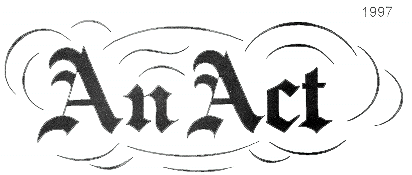

HOUSE BILL 971268
BY REPRESENTATIVES Tupa, Bacon, Kaufman, Leyba, Nichol, Paschall, Smith, Sullivant, Tool, Udall, Veiga, Zimmerman, Dean, and Taylor;
also SENATORS Duke, Arnold, Bishop, Blickensderfer,
Congrove, Hernandez, Martinez, Mutzebaugh, Norton, Pascoe, Perlmutter,
Phillips, Powers, Reeves, Rizzuto, Rupert, and Wattenberg.
CONCERNING THE PRIVACY OF ELECTRONIC COMMUNICATIONS
MADE VIA CORDLESS TELEPHONES.
Be it enacted by the General Assembly of the State
of Colorado:
SECTION 1. 1615101
(3.3) and (9), Colorado Revised Statutes, 1986 Repl. Vol., as
amended, are amended to read:
1615101. Definitions.
As used in this article, unless the context otherwise requires:
(3.3) "Electronic communication"
means any transfer of signs, signals, writing, images, sounds,
data, or intelligence of any nature transmitted in whole or in
part by a wire, radio, electromagnetic, photoelectronic, or photooptical
system that affects interstate or foreign commerce but does not
include:
(a) The radio
portion of a cordless telephone communication that is transmitted
between the cordless telephone handset and the base unit;
(b) Any wire or oral communication;
(c) Any communication made through a toneonly
paging device; or
(d) Any communication from a tracking
device.
(9) "Wire communication" means
any aural transfer made in whole or in part through the use of
facilities for the transmission of communications by the aid of
wire, cable, or other like connection, including the use of such
connection in a switching station, between the point of origin
and the point of reception, furnished or operated by any person
engaged in providing or operating such facilities for the transmission
of communications and includes any electronic storage of such
communication. but does not include
the radio portion of a cordless telephone communication that is
transmitted between the cordless telephone handset and the base
unit.
SECTION 2. 189301
(3.3) and (9), Colorado Revised Statutes, 1986 Repl. Vol., as
amended, are amended to read:
189301. Definitions.
As used in sections 189301 to 189305,
unless the context otherwise requires:
(3.3) "Electronic communication"
means any transfer of signs, signals, writing, images, sounds,
data, or intelligence of any nature transmitted in whole or in
part by a wire, radio, electromagnetic, photoelectronic, or photooptical
system that affects interstate or foreign commerce but does not
include:
(a) The radio
portion of a cordless telephone communication that is transmitted
between the cordless telephone handset and the base unit;
(b) Any wire or oral communication;
(c) Any communication made through a toneonly
paging device; or
(d) Any communication from a tracking
device.
(9) "Wire communication" means
any aural transfer made in whole or in part through the use of
facilities for the transmission of communications by the aid of
wire, cable, or other like connection, including the use of such
connection in a switching station, between the point of origin
and the point of reception, furnished or operated by any person
engaged in providing or operating such facilities for the transmission
of communications and includes any electronic storage of such
communication. but does not include
the radio portion of a cordless telephone communication that is
transmitted between the cordless telephone handset and the base
unit.
SECTION 3. 189303
(2), Colorado Revised Statutes, 1986 Repl. Vol., as amended, is
amended to read:
189303. Wiretapping prohibited
penalty. (2) Wiretapping
is a class 6 felony; EXCEPT THAT, IF THE WIRETAPPING INVOLVES
A CORDLESS TELEPHONE, IT IS A CLASS 1 MISDEMEANOR.
SECTION 4. 189305,
Colorado Revised Statutes, 1986 Repl. Vol., as amended, is amended
BY THE ADDITION OF A NEW SUBSECTION to read:
189305. Exceptions. (4.9) IT SHALL NOT BE UNLAWFUL FOR A DISTRICT ATTORNEY OR LAW ENFORCEMENT OFFICER TO LISTEN TO A RECORDING OF OR TO READ A TRANSCRIPTION OF THE CONTENTS OF AN ELECTRONIC COMMUNICATION INVOLVING A CORDLESS TELEPHONE WHEN THE DISTRICT ATTORNEY OR LAW ENFORCEMENT OFFICER HAS COME INTO POSSESSION OF SUCH MATERIALS FROM A THIRD PARTY. IN ORDER TO USE SUCH MATERIALS AS EVIDENCE IN A PROSECUTION FOR A CRIME OTHER THAN WIRETAPPING OR EAVESDROPPING, THE DISTRICT ATTORNEY OR LAW ENFORCEMENT OFFICER SHALL HAVE A REASONABLE BASIS FOR BELIEVING THAT THE RECORDING OR TRANSCRIPTION IS RELIABLE AND SHALL ALSO HAVE SEPARATE PROBABLE CAUSE BASED ON CORROBORATING EVIDENCE TO SUPPORT A REASONABLE BELIEF THAT THE CRIME WAS COMMITTED. NOTHING IN THIS SUBSECTION (4.9) SHALL PRECLUDE A DISTRICT ATTORNEY FROM PROSECUTING A PERSON FOR A VIOLATION OF SECTION 189303 OR 189304.
SECTION 5. Effective
date applicability. This act shall take effect at 12:01
a.m. on the day following the expiration of the ninetyday
period after final adjournment of the general assembly that is
allowed for submitting a referendum petition pursuant to article
V, section 1 (3) of the state constitution; except that, if a
referendum petition is filed against this act or an item, section,
or part of this act within such period, then the act, item, section,
or part, if approved by the people, shall take effect on the date
of the official declaration of the vote thereon by proclamation
of the governor. This act shall apply to offenses committed on
or after said effective date.
____________________________ ____________________________
Charles E. Berry Tom Norton
SPEAKER OF THE HOUSE PRESIDENT OF
OF REPRESENTATIVES THE SENATE
____________________________ ____________________________
Judith M. Rodrigue Joan M. Albi
CHIEF CLERK OF THE HOUSE SECRETARY OF
OF REPRESENTATIVES THE SENATE
APPROVED________________________________________
_________________________________________
Roy Romer
GOVERNOR OF THE STATE OF COLORADO